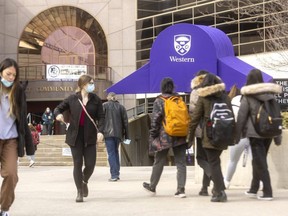The provincial government will extend a tuition freeze for college and university students through next year.

The provincial government will extend a tuition freeze for college and university students through next year.
“We do acknowledge that the freeze will help domestic students,” said Eunice Oladejo, the vice-president for external affairs with Western University’s student council and the head of the Ontario Undergraduate Students’ Alliance that lobbied for the freeze.
The province cut tuition fees by 10 per cent for the 2019-2020 academic year and froze tuition for another two years after that. The freeze is now extended to the 2022-2023 academic year.
“I think there’s no question that if we contain the direct costs to students, it will help the student,” said Michele Beaudoin, Fanshawe College’s vice-president of student services.
The province says students in university undergraduate arts and science degree programs will pay an average of $660 less in tuition.
In the current academic year, a Canadian undergraduate in those programs at Western paid $6,050 for tuition. Foreign students paid about $32,000.
“Unfortunately, international students will not be able to see the same relief in their pockets,” Ricardo De Souza, president of the Fanshawe student union, said.
De Souza said the tuition freeze offers some relief.
“I don’t think the tuition freeze gets to the point of being a game-changer to allow students to attend school,” he said. “It certainly helps, but there are many other financial aspects involved in that equation.”
For schools like Fanshawe, it means the money coming into the college “remains static” at a time of inflation, Beaudoin said, but she and her colleagues had anticipated the freeze would last, and factored that into their budget for next year.
“We made the assumption that would be the case,” she said. “It won’t, in the short term, affect any of the plans we made for the college.”
If the freeze continues, Beaudoin said, schools will be forced to be creative in how they raise money.
“What this causes is a greater reliance on donors and fundraising” as well as partnerships with industry, she said.
The cut and freeze was introduced as the province canceled a free tuition program for low-income students in 2019.
With a file from The Canadian Press
